|
|
|
Sort Order |
|
|
|
Items / Page
|
|
|
|
|
|
|
| Srl | Item |
| 1 |
ID:
110845
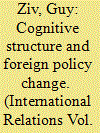

|
|
|
|
|
| Publication |
2011.
|
| Summary/Abstract |
Rationalist explanations of foreign policy change are underdetermined because they overlook the decision-makers themselves. Insight from cognitive psychology shows that individuals' cognitive structures provide a useful lens through which to understand why some people are more likely than others to change their core beliefs. Two related cognitive variables - cognitive openness and cognitive complexity - hold promise for enhancing extant explanations of foreign policy change. This article assesses the cognitive structure of the three leaders who dominated Israeli decision-making in the decade leading up to Israel's dramatic policy change vis-à-vis the PLO in 1993: Yitzhak Shamir, Yitzhak Rabin and Shimon Peres. The article demonstrates that Peres, who is found to be the most cognitively open and complex, was quicker to embrace a dialogue with the PLO than Rabin, while Shamir, who is found to hold the lowest levels of openness and complexity, rejected this move altogether. Peres, and to a lesser extent Rabin, proved to be more sensitive to international, regional and domestic changes than Shamir. This case illustrates that systemic-structural and domestic political factors are necessary, but insufficient, conditions for foreign policy change. The levels of decision-makers' cognitive openness and complexity are key to determining the likelihood that they will change their beliefs on a core policy issue that can, in turn, lead to foreign policy change. This article thus contributes to our understanding of both foreign policy change and the process leading up to the historic 1993 agreement between Israel and the PLO.
|
|
|
|
|
|
|
|
|
|
|
|
|
|
|
|
| 2 |
ID:
145618
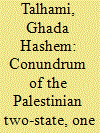

|
|
|
|
|
| Summary/Abstract |
This study seeks to explain the implications of the US's withdrawal from the Israeli-Palestinian peace negotiations, resulting in the weakening of the Palestinian Authority, and calls for abrogating the Oslo Accords. Causes of the failure of the Accords, such as the Palestinians' inability to act on Oslo's projected date of 1990 for statehood, or to stand up to the Clinton Parameters for peace, or to stem the tide of the Jewish settlement movement, or to capitalize on pronouncements of the International Criminal Court on the Wall and the settlements, are examined. International stalemate resulting from Israel's freezing of the Quartet's Roadmap leading to Israel's rebranding itself as a Jewish state hammered the last nail in the coffin of the two-state solution. The article concludes with an assessment of Israeli reaction to the one-state solution.
|
|
|
|
|
|
|
|
|
|
|
|
|
|
|
|
| 3 |
ID:
151683
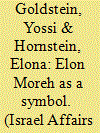

|
|
|
|
|
| Summary/Abstract |
While the establishment of the Elon Moreh locality in the second half of the 1970s constitutes an important milestone in the evolution of post-1967 Jewish settlement in the biblical lands of Judea and Samaria (or the West Bank as they have been known since their 1950 Jordanian annexation), the episode has been surprisingly neglected by the professional literature. This article seeks to fill that lacuna by exploring the factors and circumstances underlying this momentous event, as well as the political and legal struggles attending its occurrence. As such, it not only offers the first comprehensive historical account of this episode but also shed important fresh light on one of the more intractable aspects of the Israeli‒Palestinian conflict.
|
|
|
|
|
|
|
|
|
|
|
|
|
|
|
|
| 4 |
ID:
091731


|
|
|
| 5 |
ID:
154057
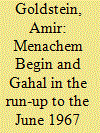

|
|
|
|
|
| Summary/Abstract |
This article discusses the causes and processes that drove Menachem Begin and his Gahal party into the Israeli cabinet during the three-week waiting period preceding the June 1967 war (or Six Day War as it is commonly known). A close examination of Begin’s behaviour reveals a calculated political move aimed at exploiting deep processes within the Israeli political establishment in general, and its right-wing factions in particular. This sheds fresh light on a number of key events preceding the war, notably Prime Minister Levi Eshkol’s surrender of the defence portfolio to Moshe Dayan, as well as on the deeper processes that led within a decade to the Likud’s (Gahal’s successor) rise to power, for the first time in Israel’s history.
|
|
|
|
|
|
|
|
|
|
|
|
|
|
|
|
| 6 |
ID:
192895


|
|
|
|
|
| Summary/Abstract |
Thirty years after its euphoric launch, the ‘Oslo peace process’ between Israel and the PLO stands as the worst calamity to have afflicted Israelis and Palestinians since the 1948 war, and the most catastrophic strategic blunder in Israel’s history. By replacing Israel’s control of the West Bank and Gaza Palestinians with corrupt and repressive terrorist entities that indoctrinated their subjects with burning hatred of Jews and Israelis, as well as murdered some 2,000 Israelis and rained thousands of rockets and missiles on their population centres, the Oslo process has made the prospects for peace and reconciliation ever more remote. By deflating the combative ethos of the Israel Defence Forces (IDF), it has weakened Israel’s national security and made the outbreak of a multi-front war a distinct possibility. By transforming the PLO (and, to a lesser extent, Hamas) into internationally accepted political actors without forcing them to shed their genocidal commitment to the Jewish state’s destruction, it weakened Israel’s international standing. And by deepening Israel’s internal cleavages and destabilising its sociopolitical system, it has created a clear and present danger to the Jewish State’s thriving democracy, indeed to its very existence.
|
|
|
|
|
|
|
|
|
|
|
|
|
|
|
|
| 7 |
ID:
161382


|
|
|
|
|
| Summary/Abstract |
This article records an interview with Joel Singer, one of the authors of the Oslo Accords who was brought into the process from Washington DC at a later stage of the negotiations. The Oslo channel was established by Deputy Foreign Minister Yossi Beilin, Norwegian academic Terje Rød-Larsen and Israeli academic Yoel Hirschfeld, who understood Yasser Arafat’s need to initiate a new path for relationships with Israel. At that time, negotiations with the Palestine Liberation Organization (PLO) were illegal. The PLO was considered a terrorist organisation and the Israeli government refused to officially negotiate with Arafat, though it was clear that he was still the person most able to strike a deal, and the only true representative of the Palestinian people. Bilateral negotiations begun in Washington between Israelis and Palestinians who were supposedly independent of the PLO led to nowhere. This is Singer’s version of this peace chapter. The article assesses the positive and negative aspects, lessons and implications of the process and of the Oslo Accords.
|
|
|
|
|
|
|
|
|
|
|
|
|
|
|
|
| 8 |
ID:
139394
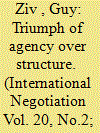

|
|
|
|
|
| Summary/Abstract |
This article advances the proposition that when the negotiator is empowered to reach an agreement on behalf of his or her government, agency has the potential to triumph over structure. The negotiator whose personal attributes include flexibility, sensitivity, inventiveness, tenacity and patience is more likely to meet this potential. Shimon Peres, the director-general of Israel’s Ministry of Defense in the mid-1950s, possessed many of these traits. He was also given virtually free rein by Prime Minister and Defense Minister David Ben-Gurion to pursue negotiations with France over the acquisition of a nuclear reactor. Despite significant structural hurdles – financial difficulties, domestic opposition, u.s. disapproval, and an unstable and divided French Fourth Republic – Peres’s unorthodox diplomacy allowed Israel to become a nuclear power. This case highlights the oft-overlooked role of agency in political science, in general, and in international negotiations, in particular.
|
|
|
|
|
|
|
|
|
|
|
|
|
|
|
|
|
|
|
|
|